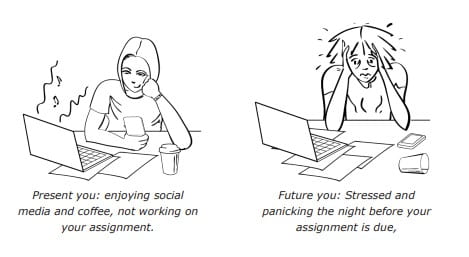Everyone struggles with procrastination at some point! Check out this page to learn useful strategies for overcoming procrastination.
He rā Whatiwhati kō
The day is right for breaking the spade.
How procrastination works
Procrastination is the act of delaying something that must be done, often because it is boring or unpleasant. For example, instead of starting your assignment, you spend time posting photos on Instagram. Then you realise an hour has flown by and it’s time for your next lecture.
Why do we procrastinate?
- How you spend your time depends on the value you place on what you are doing at that moment.
- We tend to value tasks that reward us immediately.
- When we procrastinate we are placing a higher value on these other activities with immediate rewards.
- To stop procrastinating, you need to increase the value of doing the task you are avoiding and decrease the value of these other activities. For example, “if I work on my assignment now, I will have time to go out this weekend.”, “I can leave the other stuff because I can check my Instagram feed when I take a break.”
Present you versus future you
When we make decisions about how we spend our time, we only think about our present selves and forget about the not too distant future. What are the consequences of not working on your assignment now for future you?

Strategies for overcoming procrastination
Every day, we make choices about how we spend our time. Below are some distractions and possible strategies for managing them.
Distractions:
Checking social media
- Try to focus on the current task and avoid switching between tasks.
- Try a blocking app to avoid temptation.
Searching on Google
- Be clear about what you’re looking for and save interesting articles to read later.
Checking your phone
- Keep your phone off the desk and on silent.
- Check your phone as a reward for completing your task, and put a time limit on use.
Hanging out with friends
- It’s hard to say ‘no’ when your friends are going to have fun and you’re stuck doing your assignment. However, saying ‘yes’ now will reduce the time you have to complete your assignment, and you might miss out on something better closer to the deadline.
- Consider the implications for the future if you do not work on the task now.
Strategies:
Sometimes we procrastinate or put things off because tasks or assignments seem overwhelming.
One way to conquer these daunting tasks is to break them down into a few smaller tasks, which are less intimidating and easier to start.
This is called chunking, and here is how you do it.
- Break it down: Write down all the tasks you need to complete the assignment.
- Give yourself deadlines: Work backwards from the due date and estimate how long each task will take.
- Look for gaps in your timetable: Breaks between lectures and commuting time, for example, provide an opportunity to complete small tasks.
- Schedule specific tasks: Make sure you can realistically complete the task in the time you have, e.g. find three articles, create an outline, write a paragraph.
For example, to chunk tasks for an essay, you may:
- Choose a topic
- Do some background reading
- Research the topic
- Read and take notes
- Create an outline
- Write a draft
- Revise and edit
- Proofread, format and reference
- Submit!
A useful strategy to manage distractions is the Pomodoro technique. This will help you break your study into manageable chunks.
Remember: Don’t be too hard on yourself – everyone struggles with procrastination at some point.

